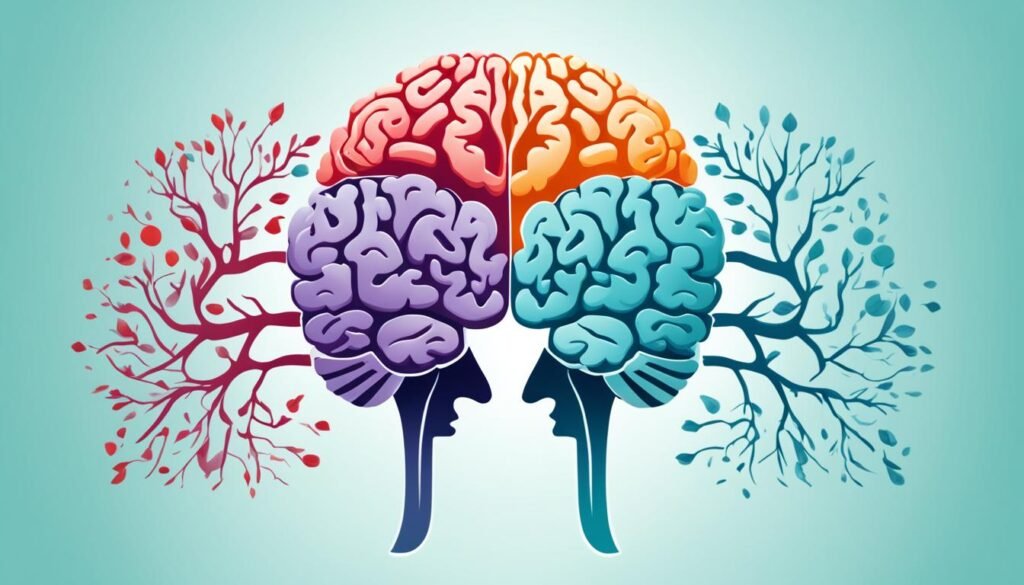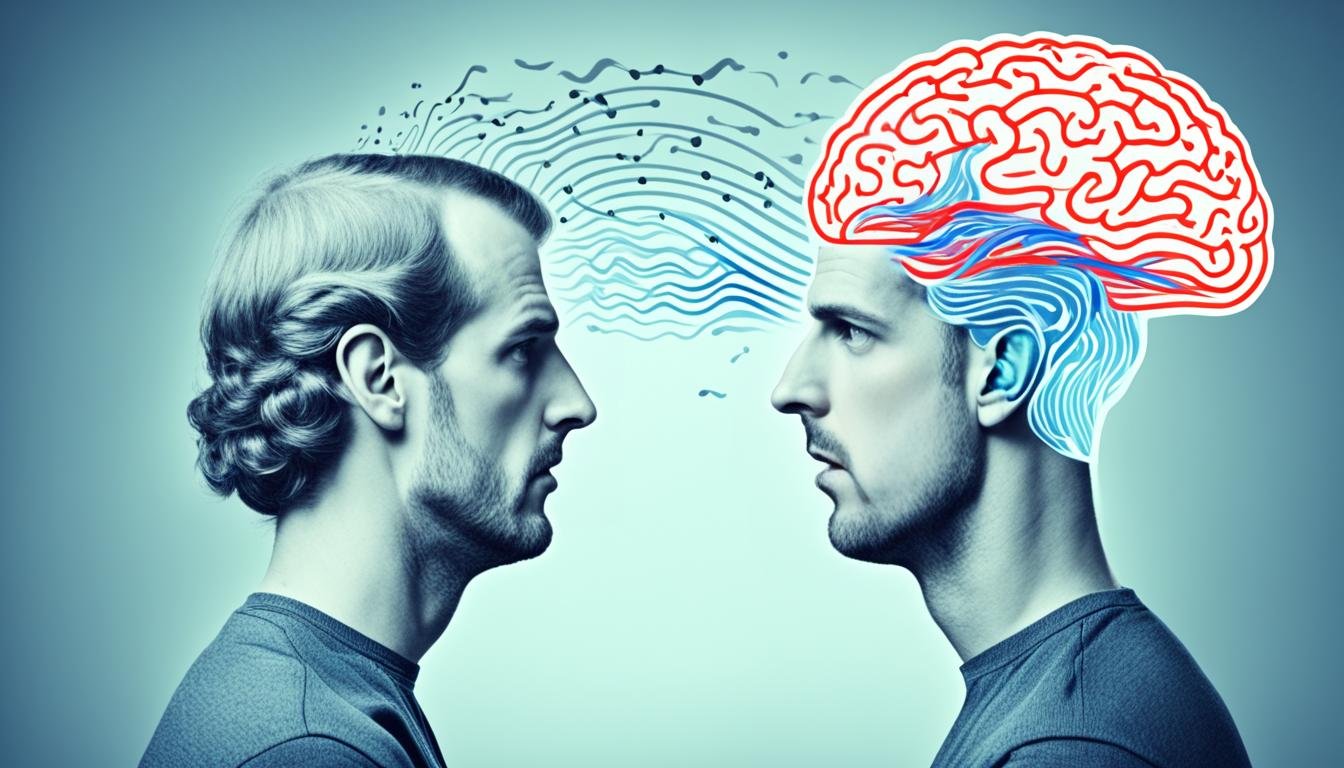As we grow older, our bodies change, and many people face hearing loss. This hearing loss isn’t just a small issue. Recent studies show that it can lead to problems with thinking and memory. This often shows up as signs of Alzheimer’s or other types of dementia. So, it’s important for everyone to know about this connection. Taking steps to keep our brains and ears healthy is key.
Over 50 million Americans deal with hearing loss, and it’s affecting their ability to think. People with hearing problems are much more likely to get dementia. The risk of dementia goes up as hearing problems get worse. It underlines why we need to spot and treat hearing issues early on. This might also help understand the causes of both conditions.
Let’s look deeper into how hearing loss might cause thinking and memory issues. First, we’ll talk about age-related hearing loss and how it affects daily life. Then, we’ll consider how staying socially active, keeping the mind active, and hearing clearly are all linked. This knowledge can help us find ways to keep both the brain and ears in good shape. It might lower the chances of facing thinking problems later on.
Key Takeaways
- Hearing loss is a common issue among older adults, affecting millions worldwide.
- Research has revealed a significant link between hearing loss and cognitive decline, particularly in the form of dementia and Alzheimer’s disease.
- The risk of developing dementia increases with the severity of hearing impairment.
- Social isolation, lack of cognitive stimulation, and auditory processing difficulties may contribute to the hearing-dementia association.
- Early interventions, such as hearing aids and assistive devices, can help improve health outcomes and potentially mitigate cognitive decline risks.
The Prevalence of Hearing Loss in Older Adults
As we get older, our hearing can decline. This is a common issue facing many older adults. According to Lin FR’s 2011 study, 66% of older Americans have a hearing problem to some degree. This issue is widespread globally, not just in the U.S.
Age-Related Hearing Loss (ARHL) Affects Millions Worldwide
Age-related hearing loss happens as we age. It’s known as presbycusis. It’s expected to be the most common kind of hearing loss. Yang et al. (2015) say by 2050, one out of four people will have hearing problems.
This type of hearing loss is a big concern for older people. Helzner EP’s 2005 research showed that 53% of older adults have it. In the U.S., two-thirds of people over 70 have some hearing loss, a study with 2,413 participants found.
| Age Group | Prevalence of Hearing Loss |
|---|---|
| 55-69 years old | 33% |
| 70+ years old | 66% |
The Impact of Hearing Loss on Quality of Life
Having trouble hearing can affect life in many ways. It’s not just about not hearing well. It can lead to difficulties in talking to others and understanding them. This might make people avoid socializing to prevent misunderstandings and awkward situations.
Hearing problems can also cause emotional issues. Feeling lonely, sad, or anxious is common among those who can’t hear well. These feelings can add up, making things even harder.
- Difficulty understanding speech in noisy environments
- Withdrawal from social activities and interactions
- Increased feelings of loneliness and isolation
- Emotional and psychological distress
Even though hearing aids can help, few older adults use them. Chien W’s 2012 study found that only 14% of older Americans use hearing aids. This shows there’s a big need to tell people about hearing care and make it easier for them to get help.
The Connection Between Hearing Loss and Cognitive Decline
I’ve researched the strong link between hearing loss and cognitive decline. This link has caught the attention of researchers around the world. And rightly so. It affects many older adults facing hearing loss with age.
Recent studies highlight a compelling connection between hearing issues and cognitive health. They consistently find that hearing loss raises the risk of cognitive problems, like dementia. This reality shows why we must care for our hearing as we grow older.
Recent Research Reveals Higher Risk of Dementia and Alzheimer’s
A study in the Journal of the American Geriatrics Society noted a big win for hearing aids. It found wearing them lowered cognitive decline’s speed by 50% over three years for those at high dementia risk. Such results underscore the link between hearing wellness and cognitive health.
Another study put over 1,000 adults to the test, showing the power of hearing aids. It revealed that among those at dementia’s higher risk who used hearing aids, cognitive decline slowed by almost 50%.
| Study Participants | Key Findings |
|---|---|
| 250 healthy older adults from a long-term heart health study | Those at more risk for dementia saw their cognitive decline slow by about 50% with hearing aid use compared to a control group. |
| 739 individuals from surrounding communities | In the main analysis, the study found no big difference between those who wore hearing aids and those who didn’t. |
Potential Mechanisms Behind the Hearing-Dementia Association
We know the link is strong, but how hearing loss and cognitive decline connect is less clear. Some theories point to:
- Strain on the brain: Effort to hear and understand can overwhelm the brain, stealing focus from other mental tasks.
- Changes in the brain: Hearing loss might alter the brain’s structure and function, speeding up cognitive issues.
- Less social contact: Trouble hearing can lead to isolation, reducing mental challenges and potentially worsening cognitive decline.
Research is still digging into these ideas, but one thing is certain: early hearing loss treatment could do a lot for brain health. Given the high numbers of affected older adults, the value of tools like hearing aids is clear.
Social Isolation and Cognitive Stimulation
I’ve looked deeply into how hearing loss and thinking problems are linked. The data is strong. When people with hearing problems avoid social settings, they miss out. The mind needs social talks and activities to remain sharp. Without these, thinking can drop fast, harming mental health.

Hearing Loss Leads to Withdrawal from Social Interactions
The tie between hearing loss and being alone is solid. A 2016 study in Ear and Hearing showed every 10-decibel hearing loss ups the risk of isolation by 52 percent. Such hearing troubles affect how well people join others and enjoy a rich social life.
Feeling isolated is not the only issue. Skipped social connections mean less brain exercise. This absence speeds up thinking problems, robbing the mind of its chance to be sharp and tough against aging signs.
Lack of Cognitive Stimulation Accelerates Cognitive Decline
We know keeping the mind busy helps fend off thinking problems. Reading, games, and chatting keep the brain strong. They support a ‘brain bank’ that fights thinking struggles as we grow old.
But, when hearing loss keeps people from being social, these smart activities get tougher. This hampers the brain’s workout. As a result, keeping sharp becomes harder.
| Study | Key Findings |
|---|---|
| Ear and Hearing (2016) | For every 10-decibel drop in hearing, the odds of social isolation increased by 52 percent. |
| JAMA Internal Medicine (2013) | Prevalence of hearing loss and cognitive decline in older adults in the US ranged from 293-299 cases. |
| Archives of Neurology (2011) | Hearing loss and incident dementia study revealed a rate of 214-220 cases. |
The facts are straightforward. Hearing loss can push people into isolation, adding to cognitive issues. Knowing how this all works can guide us in helping those with hearing challenges. We aim to keep them connected, active, and mentally fit as they get older.
Cognitive Load Theory and Auditory Processing
The cognitive load theory is very interesting to study. It helps us see how hearing loss and thinking problems might be linked. This theory shows that when hearing is hard, our brain needs to work harder. It tries to understand what sounds are coming in, making us use up more brain power.
Think of your brain like a busy city with thoughts moving like traffic. If some roads are closed, traffic has to find another way. This can cause jams and slow downs everywhere else in the city. The brain does something similar if it works harder on hearing. This can lead to other thinking problems over time.
Recent studies have found a connection between hearing loss and brain tasks. People with hearing loss tend to do worse on tasks that need thinking. This could be because their brain is working extra hard to understand what they hear.
| Hearing Loss Severity | Pure Tone Average (PTA) Range | Potential Cognitive Impact |
|---|---|---|
| Normal | 0-25 dB | Minimal to no cognitive strain |
| Mild | 26-40 dB | Slight increase in cognitive load |
| Moderate | 41-55 dB | Noticeable cognitive strain |
| Moderately Severe | 56-70 dB | Significant cognitive load |
| Severe | 71-90 dB | Substantial cognitive resources required |
| Profound | 91+ dB | Extreme cognitive demand |
The harder it is to hear, the more brain power it takes. Constantly needing to focus more on hearing can lead to brain health issues later in life.
Our senses and thoughts are closely linked. Keeping our hearing healthy is really important as we get older. Understanding how our brain works when hearing is tough can help us see the big effects of hearing loss on our health and mood.
The Impact of Hearing Loss on Sleep Quality
Hearing loss affects more than conversations and TV. It influences our sleep too. Imagine sleeping at a silent disco. You want to hear the music, but it’s just tossing and turning.
Straining to Hear Contributes to Sleep Disturbances
Untreated hearing loss pushes our brains to work too hard on fuzzy sounds. It’s like solving a puzzle with missing pieces. This effort can disturb our sleep because our minds are still processing the day’s sounds.
Research shows that people with hearing problems may change how they sleep. Their brains might be adapting to less sound but affecting their sleep cycles. It’s a complex situation!
Poor Sleep Quality Affects Memory and Concentration
Everyone values memory and focus. But, poor sleep from hearing loss can harm these abilities. Imagine forgetting where your keys are, just from not sleeping well.
Bad sleep from hearing loss can also lead to serious health issues. It’s a chain reaction. First, hearing loss causes sleep issues, then those affect our brain and health. It’s a serious matter.
| Degree of Hearing Loss | Impact on Dementia Risk |
|---|---|
| Mild hearing loss | Doubles dementia risk |
| Moderate hearing loss | Triples risk of dementia |
| Severe hearing impairment | Increases the risk of developing dementia by five times |
The link between hearing loss and bad sleep is significant. Many older adults face both issues. This shows the need to solve hearing loss to better our sleep and cognitive health.
Hearing Loss and Cognitive Decline: The Role of Cognitive Reserve
Exploring the link between hearing loss and cognitive decline is eye-opening. I’m amazed by the brain’s adaptability. The concept of cognitive reserve is key here. It’s the brain’s ability to handle aging issues and is affected by lifelong factors like education and job.
Hear this out: those with hearing loss might have less cognitive reserve. This means they are more at risk of cognitive issues as they age. Hearing problems strain cognitive abilities, not giving the brain enough time to adapt. This can speed up cognitive decline without proactive care.

Reduced Cognitive Reserve Increases Vulnerability to Decline
Hearing loss stands out as the top changeable risk in dementia, linking to 8% of cases globally. This shows how crucial hearing health is for the mind.
But why does lower cognitive reserve raise the risk of decline? Some crucial insights explain:
- Participants in a 1968 study performed worse on word-recall tasks under simulated hearing loss conditions compared to normal listening conditions.
- A 1989 case-control study reported higher odds of dementia in individuals with hearing loss compared to those with normal hearing.
- Multiple sensory impairments, such as combined vision and hearing loss, are associated with an increased risk of dementia among older adults.
These insights highlight cognitive reserve’s role in safeguarding our brains. By doing activities that challenge us mentally, continuing to learn, and leading an active life, we can boost our cognitive reserve. This helps guard against cognitive decline as we grow older.
| Clinical Category | Pure Tone Average (PTA) |
|---|---|
| Normal | PTA |
| Mild | 20 to |
| Moderate | 35 to |
| Moderately Severe | 50 to |
| Severe | 65 to |
| Profound | 80 dB or greater |
Dealing with hearing loss early and maintaining cognitive reserve is vital. Stay mentally active, always seek to learn, and use aids like hearing devices as needed. Doing these things gives our minds the boost they need to stay healthy.
Early Interventions for Improved Health Outcomes
I care a lot about my health. So, I’m always looking for ways to keep my brain sharp. It’s interesting to know that hearing loss links to a drop in our thinking skills. But, starting early can really help us stay healthy as we get older.
Restoring Hearing Abilities Enhances Social Engagement
Fixing our hearing can do wonders for our brain’s health. It lets us join in conversations and enjoy parties more. This can keep our mind active and sharp.
Studies have shown that using hearing aids can help our brain work better as we grow older. In a study, Maharani et al. (2018) found that using a hearing aid slowed down how fast adults’ minds declined. So, if you’re having trouble hearing, getting a hearing aid can really change things for you.
Targeted Exercises to Boost Brain Function
We can also help our brain by doing specific exercises. These are especially good for people with hearing problems. They make up for less noise coming in and keep our mind active.
Here are some exercises that are great for our brains:
- Memorizing things, like a new language or poems
- Working on puzzles, like crosswords or Sudoku
- Challenging books or articles
- Playing music
Adding these exercises to our routine helps our brain stay sharp. This is important as we get older and our brain changes.
| Intervention | Benefits |
|---|---|
| Hearing Aids | Improved social engagement, slower cognitive decline |
| Brain-Boosting Exercises | Enhanced cognitive function, mental stimulation |
To sum up, it’s essential to act early when it comes to hearing loss. Solutions like hearing aids and brain exercises can greatly improve our future health. They help bring back our hearing and keep our minds actively learning. Let’s start these interventions now to care for our brains better!
Adopting a Holistic Approach to Brain Health
Seeing how hearing loss affects our thinking shows we need to think about brain health as a whole. Fixing our hearing is vital but just a part of the solution. To be our best, we need to do many things. This includes staying active, eating well, keeping our minds busy, and being social.
Being active is great for our brains. It boosts blood flow and makes the brain grow new connections. Try to walk, swim, or do yoga. These activities keep our brains strong.
Eating right is also key to thinking well. Foods with omega-3, antioxidants, and B vitamins are good for our brains. Eat a lot of fruits, veggies, whole grains, and lean meats to give our brains what they need.
Keeping our minds busy matters too. Reading, doing puzzles, or learning something new builds our brainpower. Doing these things can keep us sharp and help prevent memory loss.
Being with others is very important for our brain health. Talking, doing things together, or helping out in the community makes us feel part of something. This can help keep our thinking clear and make us feel happy.
If you want to take good care of your brain, consider the Brain Wellness & Lifestyle Program at the Pacific Neuroscience Institute® (PNI®). Their experts can guide you. They use the newest research and methods to boost memory and make life better.
To keep our brains healthy, we need to take care of our ears, stay active, eat well, learn new things, and be with people. It’s always the right time to start caring for our minds. So, let’s start today and make a better future for ourselves.
Preventative Measures to Reduce Risks
When it comes to keeping our minds sharp as we get older, taking steps to prevent issues is vital. Prevention is about lessening the chance of problems before they happen. By taking proactive steps, we might avoid hearing issues that lead to memory problems later. It’s all about the power of prevention!
Avoiding Loud Noise Exposure and Using Hearing Protection
Want to prevent hearing loss? Stay away from loud noises. This means not blasting music in your headphones or going to loud concerts without protection. Loud sounds can harm your ears, which affects your ability to hear. So, be wise and use earplugs or headphones that block noise when you’re in loud places. Your ears will be grateful!
Check out these eye-opening statistics:
| Statistic | Value |
|---|---|
| Individuals in Minnesota and Wisconsin with hearing loss | 1 in 5 |
| Potential reduction in cognitive decline risk with hearing aids | 50% |
| Hearing loss as a significant risk factor for dementia development | Proven by research |
The Benefits of Hearing Aids and Assistive Devices
Already have hearing loss? Don’t worry! Hearing aids and other devices are here to help. These devices make sounds clearer, which helps your brain understand more easily. They also lessen the effort your brain needs to make to hear, giving it a rest.
A recent study with 3,000 participants showed something interesting. While hearing aids didn’t help everyone, they did lower the risk of memory problems in older people who were at a higher risk by 48%. This find shows why it’s wise to wear hearing aids if you need them!
Let’s all protect our hearing. This involves staying away from loud sounds and using protection when we can’t avoid them. It also means using tools like hearing aids to keep our minds sharp. In this way, we can lower the risk of problems and enjoy life with our full senses!
Comprehensive Care at the Pacific Eye, Ear, and Skull Base Center
Our center offers top-notch care for eye, ear, nose, throat, and skull base issues. We have a team of skilled specialists. They work together to find the best treatments for every patient.
For ear and hearing problems, we have the latest diagnostic and treatment options. Our goal is to improve your hearing and life. Our experts in audiology and otology are here to help.
Specialized Treatments for Ear and Hearing Issues
Our team includes specialists like Dr. Samantha Dixon, Dr. Jamie Natkin, and many more. They have deep knowledge in treating ear issues, hearing loss, and skull base problems.
| Specialist | Area of Expertise |
|---|---|
| Dr. Samantha Dixon, Au.D. | Pediatric diagnostic evaluations and hearing loss interventions |
| Dr. Jamie Natkin, Au.D. | Adult hearing loss, cochlear implants, and hearing aids |
| Dr. Eric Seper, Au.D. | Adult cochlear implants, vestibular evaluations, and hearing aid care |
| Dr. Joshua D. Sevier, Au.D., LL.M. | Cochlear implant audiology and hearing loss programs |
| Dr. Brittney Sprouse, Au.D. | Pediatric audiology, diagnostic evaluations, and interventions |
| Dr. Michael B. Gluth, M.D. | Chronic ear disease management and cochlear implants |
| Dr. Dana Suskind, M.D. | Pediatric cochlear implantation and language development |
| Dr. Fuad Baroody, M.D. | Pediatric ear disease management |
| Dr. Andrea Shogan, M.D. | Recurrent ear infections and ear disease management |
| Dr. Terence Edward Imbery, M.D. | Adult and pediatric ear and hearing care, cochlear implants, and skull base surgery |
Managing Tinnitus, Vertigo, and Balance Disorders
Our experts can help with tinnitus, vertigo, and balance problems. We use advanced techniques to diagnose and treat these issues. Our goal is to help you feel stable and well.
We know how much ear and hearing problems can affect your life. That’s why we offer caring, personalized care. With our team and facilities, you’re in good hands.
Conclusion
The link between hearing loss and cognitive decline is strong. Many studies show this connection. With millions affected worldwide, understanding this is vital. Letting hearing loss go untreated can cause cognitive problems to get worse, even leading to dementia and Alzheimer’s.
Preventing hearing loss is important for our cognitive health. We should avoid loud noises and use protection when needed. Early use of hearing aids and other devices helps. It’s important to take care of our hearing from early on. But it’s also never too late to start protecting our ears and brain.
The Pacific Eye, Ear, and Skull Base Center knows a lot about hearing loss. Their experts offer care that fits each person’s needs. They treat many conditions beyond hearing loss, like tinnitus and balance problems. Remember, taking care of your hearing means safeguarding your brain for the future.

